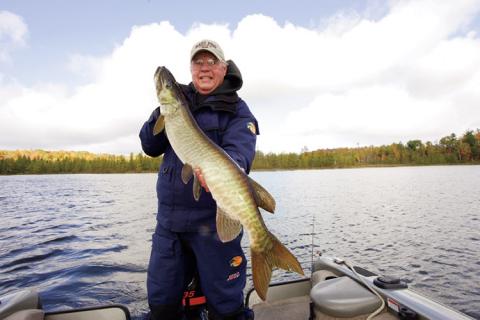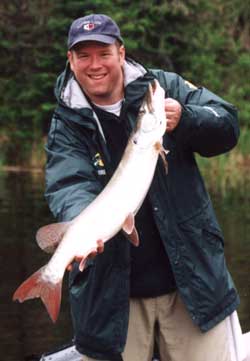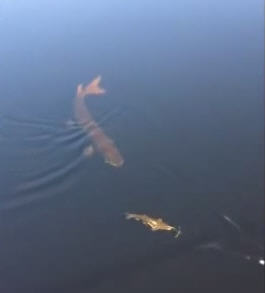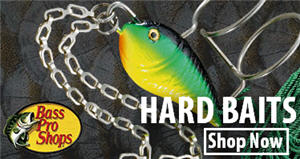
It's a well-worn cliche that muskie are a fish of a thousand casts. There's some truth to this statement, but experienced anglers know how to lower these odds. To help improve your muskie game, here's a list of 10 things you can do to increase your success rate, with a particular focus on casting.
![]() TIP: Quiz: Are You Ready to Catch the Biggest Muskie of Your Life? - LINK
TIP: Quiz: Are You Ready to Catch the Biggest Muskie of Your Life? - LINK
![]() WATCH VIDEO: Outfitting the Beginner Muskie Angler - LINK
WATCH VIDEO: Outfitting the Beginner Muskie Angler - LINK
1. Take Care of Your Fishing Gear
 |
| Understanding the seasonal movements of muskie will help you to locate fish throughout the season. |
Fishing rods, reels, tackle, nets— these are the tools we use to catch fish. And with the same care and attentiveness that a good craftsman keeps his tools, so should we anglers keep our gear in excellent condition.
This care begins with fishing hooks. Sharp hooks are one of the most important factors to increase your muskie hook-up rate. Next is a balanced muskie rod and reel combo. Keep your reel properly lubricated. It should be spooled with a high-quality line that is checked regularly for nicks and fraying and replaced as needed. Rods should also be inspected for wear and tear, especially the guides.
2. Stay Organized
Your tackle and boat should be organized. Having things ordered will make you a more efficient angler. Over the course of the day, your muskie lures will see more water time if you know where tackle is and can quickly change baits when needed.
The same rationale applies to release tools and general boating equipment. The less time spent looking for things, the more time you can spend fishing. As a general rule, it's best to plan and organize tackle and gear the day or night before an outing. Setting up at the boat ramp or parking lot wastes valuable fishing time.
3. Learn to Effectively Work an Area
There are few anglers that I've been out with that typify strategic casting. Anglers that practice strategic casting focus on the area they want to fish and systematically dissect it with precise casts. Beyond casting accuracy, these anglers know the baits they want to use to work the area. They are also excellent at boat control in order to ensure baits are presented effectively.
Next time you're casting an area, consider viewing it as a grid and break it into components. Try and present the bait to these various quadrants. Consider multiple passes on the same piece of water to thoroughly work the area. Also, try using different baits that cover the entire water column.
Not only is fishing with a partner a good safety practice, it also allows you to cover more water and hook more fish. However, two people fishing in a boat isn't enough, you need to fish as a team.
In many respects this breaks down to communication and answering questions like the following: How are you going to fish together to work an area? What lures will you each use? Will one of you throw a topwater the other a jerkbait? Will one person fish deep the other shallow?
In essence, fishing as a team lets you cover water effectively and betters your odds of hooking a muskie. Team fishing is built on communicating how you plan to fish your combined lines and lures to maximize your time on the water.
5. Master the Hook Set
If you're a fan of casting baits, you're only as good as your hookset. The bony mouths of muskie require powerful hooksets and trophy fish will likely shake free if you don't bury the hooks. When casting, you should constantly be asking yourself, "Am I ready to set the hook?" The answer is "no" if you're off balance, looking at the clouds or adjusting your hat.
Setting the hook on a muskie is about speed, power and moving a lot of line. If you're not comfortable with setting the hook, it's best to practice. Here is a simple method: Take your rod and reel outside, tie the line to a fixed object (like a fencepost), loosen your drag slightly, and practice setting the hook until the movement becomes natural. This way, when it's time to do it on the water, the motion will be ingrained in your mind and, hopefully, will be second nature.
 6. Strive to See Follows
6. Strive to See Follows
Spotting muskie is half the battle, so it is critical to look for muskie follows (muskie following the lure) when casting. Once you locate one, you can then work the fish and hopefully get it to bite. Using different baits or returning at a later time are two excellent options to try and hook a fish that you've spotted.
To see follows, you need to be watching for them. This begins by using polarized glasses to cut down on glare off the water's surface. Wearing a hat to reduce the overhead sunlight will also help. When bringing in your lure, focus on the area around it. Don't watch your lure. Look behind it, below it, and off to the sides; these are areas where muskie will come from.
When the lure approaches the boat, work it in a figure 8 or an L-pattern and scan the water for signs of a fish. Trust me, learning to spot fish can dramatically improve your season because once you see them and know where they are, hooking a muskie becomes a much easier task.
7. Concentrate on Mastering Baits
With so many new baits out every year, many anglers acquire baits faster than they learn to properly work these lures. For example, all jerkbaits don't behave the same. It takes time to learn how different lures move in the water and proper retrieves for baits.
Mastering baits doesn't have to be daunting. Simply choose one or two baits you intend to become a master at each season. Consider only going out with a spinnerbait (or another lure) and fishing it for an entire day. Once you get a few baits under your belt, it will become easier to learn new ones. You'll find transferring know-how from one lure to another is easier once you've mastered a few jerkbaits, crankbaits, topwater, bucktails, and so on.
8. Fish With Other Anglers
Time on the water is one of the best ways to better your angling skills. Getting out and fishing with different people will help you learn new things. Every time I fish with someone I learn something. In the muskie fishing game, any trick you can pick up to fool these elusive predators is important. An excellent way to expand your fishing-friends network is to join a club. Muskies Inc. and Muskies Canada are two great organizations for this purpose.
9. Find the Spot on the Spot
It's one thing to find a good stretch of water, but it's another to find the prime real estate on an area where big muskie hold. This special space is often referred to "the spot on the spot," and as the top predator in most freshwater systems, muskie can muscle their way into the best areas.
What makes one spot better than all the rest? The answer is the extra features provided that aren't available in the larger area. On a weed flat, this could be an inside turn that holds a fallen tree providing a prime ambush set-up. On a long point, it could be a small hump that forms and holds a few green weeds surrounded by deeper water.
Whatever the characteristics, always look for the extra details in an area and make a record when you find them (both in your notes and GPS unit). More often than not, these spots will hold big fish throughout the season.
10. Learn the Seasonal Movements of Muskie
Like all wildlife, muskie follow seasonal patterns influenced by water temperature and other factors. Understanding these movements will help you to locate muskie throughout the fishing season.
Muskie tend reside in the upper water levels when they are active and the lower water levels when they are inactive. The warmer the top layer of water, the more likely muskie will seek a comfortable water temperature at greater depths. In the greater water depths, the muskie are are less likely to be combative.
Of course, muskie will behave slightly different in the various waterbodies that exists (e.g., rivers versus lakes, clear water versus stained), but the overall seasonal patterns and movements will be similar. Reading some muskie-specific fishing books and biology papers and watching videos will boost your knowledge of what muskie do throughout the course of the year. Establish a good understanding of seasonal movements, and it will be a big factor in finding more fish.
These are just a few tips to boost you muskie game. Fishing is a sport of continuous improvement, so always strive to better your skill level. Try the above suggestions and you'll be on your way to landing more muskies this season.
Outfitting the Beginner Muskie Angler
- 19176 views


